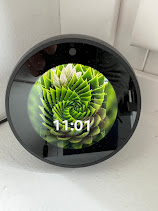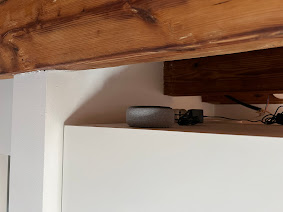

Left: Our Amazon Alexa spot called "Ziggy". Right: Our Amazon Alexa dot sitting on a shelf.
We have noticed a degradation in Alexa. It’s hard to quantify, but it’s there. Today we went to ask for something we’ve asked for many times and she shoved us into a strange skill with a name that sounded similar. Then, we couldn’t escape that skill. We wasted one hour trying to get back to normal. Not a productive use of time.
Our Alexa (spot) and Ziggy (dot) have settled into answering the following:
But these queries aren’t that interesting and can easily be taken over by something else in the future. “Ziggy” is our downstairs Alexa and “Alexa” is our upstairs one. We gave them different names because we’d be asking the downstairs Alexa for something, and the upstairs would answer. Our downstairs Alexa (now Ziggy) is deaf, and our upstairs one has great hearing it seems.
Yes, our expectations have gone up in recent years as we experience LLM magic (like ChatGPT), but it’s also that Alexa has lost something. Some say (see this reddit thread) it’s because of the recent reduction of people and investment in Alexa, while others more cynically say it’s a ploy to dumb down the existing services, so we’ll be primed to purchase the next big thing when introduced. One poster on the reddit thread said, “Alexa didn’t lose intelligence, it gained stupidity.” Hmm?
When Amazon introduced these devices, we all said oh, Amazon is going to dominate the home, and that it’s Amazon from here on out, for the foreseeable future. Well, not so fast.
We seem to have two responses when a new technology is introduced:
In the small town in Connecticut where I grew up, we would shop at the A&P. Ever heard of it? Didn’t think so. When we shopped there in the 1970s it was already a bit shabby and faded from its former glory.
The Great Atlantic & Pacific Tea Company (A&P) was an American chain of grocery stores that operated from 1859 to 2015. It was founded in 1859 as “Gilman & Company” by George Gilman in New York City. A&P started as a small chain of retail tea and coffee stores, and then expanded into a national mail order business so that by 1900 there were nearly 200 stores.
At its peak, it's reported that A&P had 10% of the total US grocery market. It was the largest grocery retailer in the United States and the world’s largest retailer overall until 1965. In its time, A&P was known for innovation, offering a vast assortment of food products at lower costs. It introduced the economy store concept in 1912 and later adopted the self-serve supermarket concept in 1936. Yet despite innovation, it closed its doors in 2015. For people living in the 1940s or 1950s A&P was likely a brand as iconic as Amazon is today.
Nothing is forever. And we are not good at extrapolating or making predictions about the future. Until the obituary officially appears, I guess we are stuck with Alexa. As for Ziggy, I’m off to buy a hearing aid for him.
We have noticed a degradation in Alexa. It’s hard to quantify, but it’s there. Today we went to ask for something we’ve asked for many times and she shoved us into a strange skill with a name that sounded similar. Then, we couldn’t escape that skill. We wasted one hour trying to get back to normal. Not a productive use of time.
Our Alexa (spot) and Ziggy (dot) have settled into answering the following:
- What time is it?
- What’s the temperature?
- Set a timer for 10 minutes.
- Open one of our custom-built skills. (This is always a crap shoot.)
But these queries aren’t that interesting and can easily be taken over by something else in the future. “Ziggy” is our downstairs Alexa and “Alexa” is our upstairs one. We gave them different names because we’d be asking the downstairs Alexa for something, and the upstairs would answer. Our downstairs Alexa (now Ziggy) is deaf, and our upstairs one has great hearing it seems.
Yes, our expectations have gone up in recent years as we experience LLM magic (like ChatGPT), but it’s also that Alexa has lost something. Some say (see this reddit thread) it’s because of the recent reduction of people and investment in Alexa, while others more cynically say it’s a ploy to dumb down the existing services, so we’ll be primed to purchase the next big thing when introduced. One poster on the reddit thread said, “Alexa didn’t lose intelligence, it gained stupidity.” Hmm?
When Amazon introduced these devices, we all said oh, Amazon is going to dominate the home, and that it’s Amazon from here on out, for the foreseeable future. Well, not so fast.
We seem to have two responses when a new technology is introduced:
- said technology is here to stay and that’s it, game over for other technology
- said technology will have incremental improvements
In the small town in Connecticut where I grew up, we would shop at the A&P. Ever heard of it? Didn’t think so. When we shopped there in the 1970s it was already a bit shabby and faded from its former glory.
The Great Atlantic & Pacific Tea Company (A&P) was an American chain of grocery stores that operated from 1859 to 2015. It was founded in 1859 as “Gilman & Company” by George Gilman in New York City. A&P started as a small chain of retail tea and coffee stores, and then expanded into a national mail order business so that by 1900 there were nearly 200 stores.
At its peak, it's reported that A&P had 10% of the total US grocery market. It was the largest grocery retailer in the United States and the world’s largest retailer overall until 1965. In its time, A&P was known for innovation, offering a vast assortment of food products at lower costs. It introduced the economy store concept in 1912 and later adopted the self-serve supermarket concept in 1936. Yet despite innovation, it closed its doors in 2015. For people living in the 1940s or 1950s A&P was likely a brand as iconic as Amazon is today.
Nothing is forever. And we are not good at extrapolating or making predictions about the future. Until the obituary officially appears, I guess we are stuck with Alexa. As for Ziggy, I’m off to buy a hearing aid for him.
No comments:
Post a Comment
All comments are moderated. If your comment doesn't appear right away, it was likely accepted. Check back in a day if you asked a question.